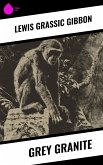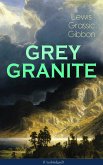Set against the backdrop of early 20th-century Scotland, Lewis Grassic Gibbon's "Grey Granite" is the final installment of the acclaimed "A Scots Quair" trilogy. This novel intricately weaves together themes of industrialization, class struggle, and the quest for personal identity, employing Gibbon's distinctive lyrical prose and keen social observation. The narrative captures the tension between the rural heritage and the encroaching urban landscape, reflecting the profound changes that shaped Scottish society in this period, all while fostering a deep empathy for its characters. It is characterized by its innovative use of dialect, symbolizing the clash of cultures in a rapidly modernizing world. Lewis Grassic Gibbon, the pen name of James Leslie Mitchell, was born in 1901 in rural Kincardineshire, Scotland, and held a deep affinity for the Scottish landscape and its culture. His own experiences during World War I and subsequent involvement in socialist and nationalist movements deeply influenced his writing. "Grey Granite" serves as a potent socio-political commentary, addressing the complexities of modernity, identity, and the human spirit, shaped by Gibbon's own reflections on his homeland. For readers seeking a profound exploration of personal and national identity against the tide of modernization, "Grey Granite" stands as a powerful work that transcends its historical context. Gibbon's masterful narrative invites readers to engage with the pressing issues of their time, making this novel a timeless reflection on the human condition that deserves a place on any discerning reader's shelf.
Dieser Download kann aus rechtlichen Gründen nur mit Rechnungsadresse in A, B, BG, CY, CZ, D, DK, EW, FIN, F, GR, H, IRL, I, LT, L, LR, M, NL, PL, P, R, S, SLO, SK ausgeliefert werden.









